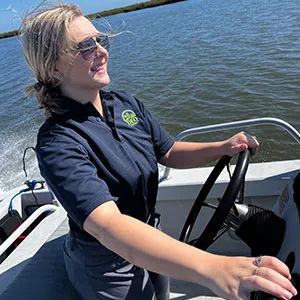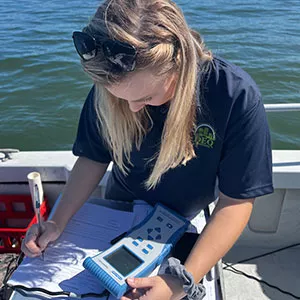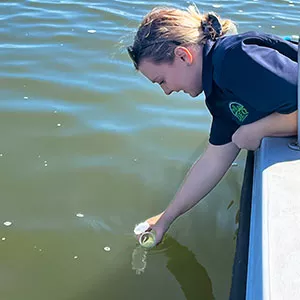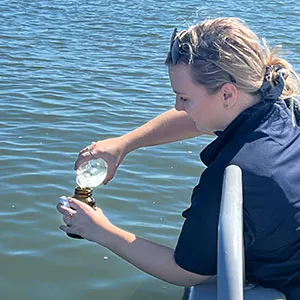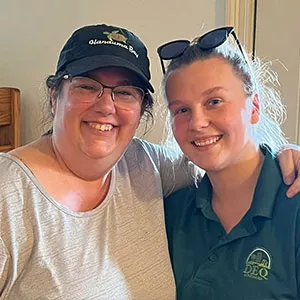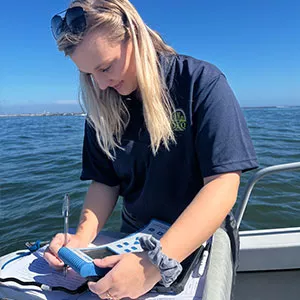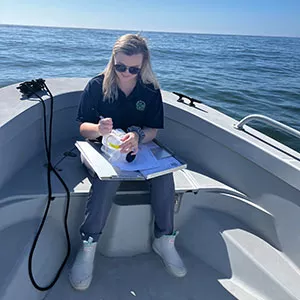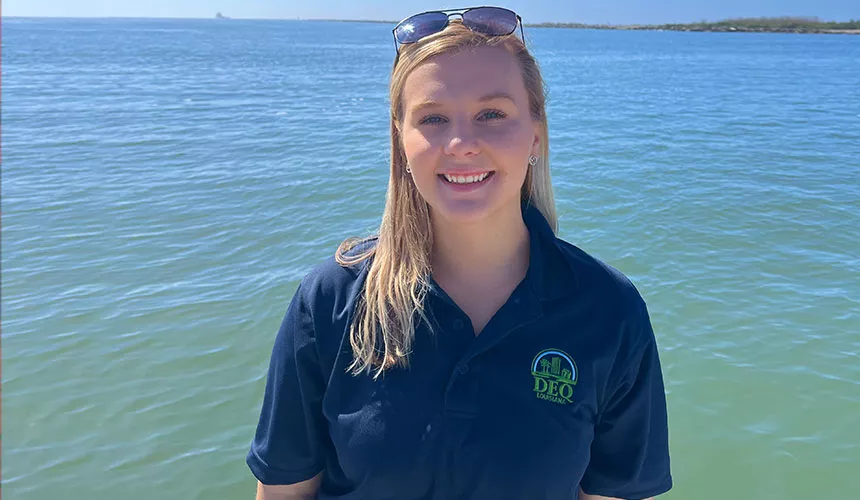
Growing up in Oneonta with a mother who worked as a nurse and a father who loved exploring the wilderness, Amy Shultis knew early on that she wanted a career helping people and the environment. After taking three sustainability-focused, faculty-led trips to Guatemala, Japan and New Orleans while a student at SUNY Oneonta, she realized she could pursue both passions with a career as an environmental scientist.
Why SUNY Oneonta?
I chose SUNY Oneonta for multiple reasons. When I was in high school, my father passed away. After that, I spent two years living alone with my mom once my older sisters went off to college and moved out. I wanted to be close to my mom in case she needed anything, so I chose the college in my backyard. I also had the option to live at home, which I did during my last two years of college. Oneonta was one of my top choices because it had great academics. While touring other colleges, I never found a campus as welcoming and beautiful as SUNY Oneonta.
Why did You Choose Your Majors?
Well, when I first started at SUNY Oneonta, I wanted to go into physical therapy, so I was attending to get a general biology degree. After that, I planned to go to a physical therapy graduate school. Growing up spending countless hours outside exploring the wilderness with my father and my mother being a dedicated nurse, I had a passion for helping people and the environment. Those passions led me to choose biology, and I added a second major in environmental sustainability along the way. That is when I decided I no longer wanted to be a physical therapist. I wanted to be a scientist.
What did You like About Your Majors?
What I liked about my majors was understanding how the environment works as a whole; every little thing has its place and purpose. To be able to look outside and recognize the complexity of what is taking place that you can’t even see is astonishing. Learning how ecosystems function and the causes and effects of human interactions with the environment was something I found very interesting. I don’t have just one favorite class because I took so many excellent courses.
What Were Your Favorite Classes?
My favorite classes were Wetland Delineation with Dr. Vogler, Disasters in Geography (included a volunteer portion in New Orleans) with Dr. Lascell, Conservation and Sustainability of Ogasawara Islands of Japan with Dr. Kiyoko and Paul Lord, Water and Environment of Guatemala with Dr. Allen and Stream Ecology with Dr. Heilviel. All those classes included fieldwork, which was my favorite part.
Best Experiences at Oneonta?
My best experience on campus was becoming a Resident Advisor, Orientation Leader and Orientation Advisor. These experiences allowed me to create lifelong friendships and become a more inclusive person. Traveling to Guatemala and Japan were tremendously eye-opening experiences that taught me about environmental problems I didn’t see in my normal day-to-day. Electroshocking fish with Dr. Heilveil and tromping around wetlands with Dr. Vogler allowed me to see more than just a stream by understanding the roles every item in the ecosystem fulfills. One of the most life-changing experiences I had was traveling to New Orleans with Dr. Lascell. That volunteer trip ignited my passion for helping the environment, and after that trip, I added environmental sustainability as a second major.
What Does Your Job as an Environmental Scientist Entail?
My duties are to perform monthly water quality runs over bridges or by boat to collect data for the environmental protection agency regulations; assist in oil spill response; analyze and interpret water and air regulations to perform facility inspections; and assist the public with questions and complaints. Louisiana’s Department of Environmental Quality has offices all over Louisiana, and my office focuses on southeast LA.
Most Rewarding Part of Your Job?
The most rewarding part of my job is, every day, going out in the beautiful swamps and marshes of Louisiana, knowing that I am here to keep it safe. Louisiana is incredibly susceptible to rising sea levels, hurricanes, tornadoes and erosion. Every day, the coastline is deteriorating, which causes detrimental issues to diverse ecosystems and the people who live here. Knowing that I am doing my part to keep the air and water of Louisiana clean is exactly what I wanted to do when I was in college.
Future Career Plans?
My career plans are to continue to help the environment on behalf of the state of Louisiana. I will continuously work to become a better well-rounded scientist. I currently love my job, and I plan on staying with it for the near future.
